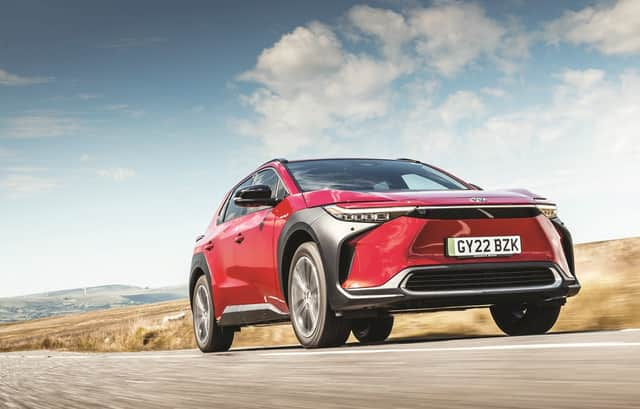Beyond zero: Toyota's new electric car strategy comes to life


The Japanese carmaker’s hesitation has seen Tesla take ownership of the sector’s shorthand term for electric vehicles (EV) and that is just as well, because bz4X fails to trip of the tongue.
The “bz” refers to Toyota’s Beyond Zero strategy for growth in EVs, the “4” aligning the new model’s size to the existing Rav4 and X communicating its crossover style. Simple, right?
Advertisement
Hide AdAdvertisement
Hide AdPrices start at £45,710 in a range that includes Pure, Motion, Vision and Premier Edition trims and the choice of a single motor front-wheel-drive and dual motor all-wheel-drive drivetrains — topping out at £55,710.
All versions feature the same 71.4kWh (usable capacity) battery, with front-driven variants claiming a 317-mile range between charges and AWD 286 miles.
Performance-wise, the former claims a 7.5 second acceleration to 62mph, the latter 6.9.
Toyota’s first EV is more angular than many of the newer models in its range, aligning most closely to the Rav4, but a long wheelbase (2,640mm) makes for plenty of interior space.
Advertisement
Hide AdAdvertisement
Hide AdWhile the roofline is relatively low — leaving a driving position somewhere between its Kia EV6 and taller Skoda Enyaq rivals — rear legroom is sizeable.
Boot space of 452 litres also sits between the EV6’s 490 litres and the Enyaq’s 585.
Even the entry-level bz4X Pure features adaptive cruise control, keyless entry and start and a cabin pre-conditioning system, along with a reversing camera and a heat pump said to improve range in colder conditions.
Inside, a large cubby under the centre armrest, a phone charging tray behind the joypad-style gear selector, space underneath the “floating” centre console and sizeable door bins offer good storage, but the bZ4X goes without a glovebox.
Advertisement
Hide AdAdvertisement
Hide AdComfortable seats are standard fayre and the driving position is good, but a test drive is essential thanks to a Peugeot i-Cockpit-aping instrument binnacle which places the driver’s display above the steering wheel.
While Peugeot’s set-up has always worked okay for me, I did find it hard to achieve a totally unimpeded view of the bz4X’s display.
Entry-level Pure models have an eight inch touchscreen infotainment system, with other trims featuring a 12.3-inch screen.
The system’s graphics are sharp and functionality intuitive and it ties into a Toyota MyT app which gives handy access to EV-optimised routes and allows owners to pay for charging.
Advertisement
Hide AdAdvertisement
Hide AdNot all the plastics in the bz4X boast visual or tactile appeal. While touches of piano black trim look good, there are cheaper-looking aspects that leave the cabin feeling less special than that of a similarly-priced Kia EV6.
Out on the road the bz4X proves comfortable over most surfaces, but there is a sense that short throw suspension can be overwhelmed by larger imperfections.
The majority of the time, this limited scope of pliancy delivers decent control through corners, with minimal lean and pitch.
While proving more dynamic than a Skoda Enyaq, Kia’s EV6 or the Hyundai Ioniq 5 do pip it for outright balance.
Advertisement
Hide AdAdvertisement
Hide AdDriving range proved to be something of a bugbear for me during my time with the bz4X.
Journeys in my all-wheel-drive test vehicle indicated a range of around 220 miles might be realistic with the climate control deactivated. Summoning a blast of warm air could see that dip by 20 per cent.
It is an issue that has been identified and highlighted in other road tests, prompting Toyota to make adjustments to the trip computer’s range projections for newer cars.
Among the benefits of the 4WD bz4X is a version of manufacturing partner Subaru’s X-Mode terrain control system, which tailors its drivetrain to snow, mud and other obstacles.
It also delivers an impressive 500mm wading depth off-road.
Advertisement
Hide AdAdvertisement
Hide AdThe bZ4X can also be charged at 150kW — faster than its Volkswagen Group rivals — to deliver a 10-80 per cent charge in as little as 32 minutes.
A full charge from a 7kW home charger should take under 13 hours.
Toyota’s first foray into EVs has not come without its issues, with the bz4X’s ability to deliver on its WLTP test results for range being most disconcerting.
For sure, it is another family-friendly EV with a level of space and connected technology that will appeal to potential buyers, but it leaves me in no doubt that there is a lot more to come from the world’s biggest car manufacturer.